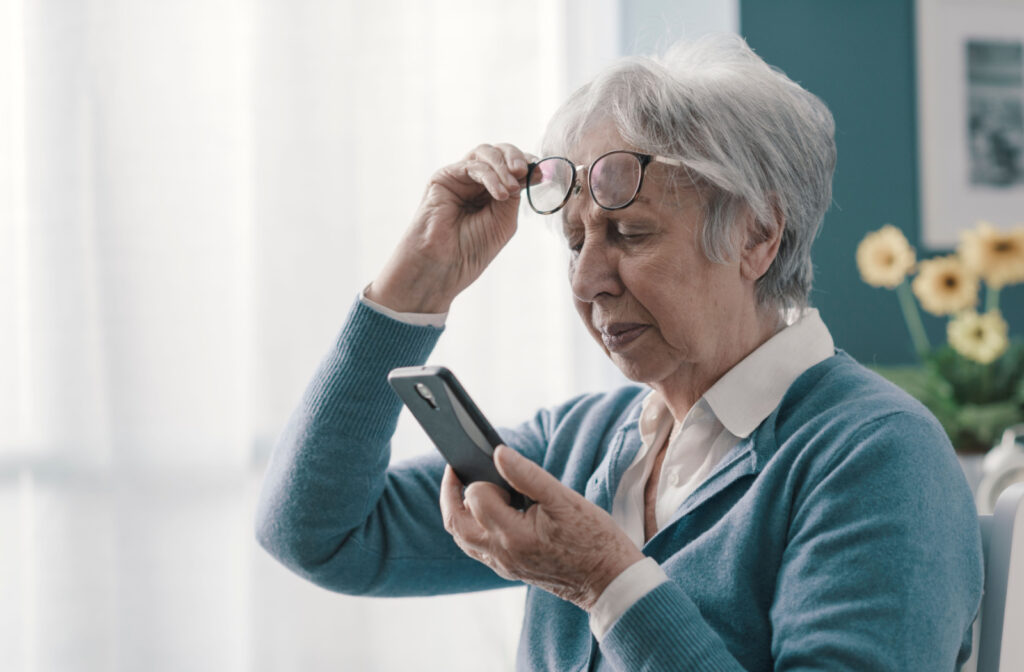At Signature Eye Care, we can identify early signs of myopia and can help with the management and control of this condition. If you believe you or your loved one has a severe form of nearsightedness, also known as high myopia, we have ways to help.
High myopia can’t fully be corrected, but there are means of slowing its progression and managing symptoms.
If you or your children have an eye appointment at Signature Eye Care, you’ll receive expert advice and personalized solutions to help protect and preserve your eyesight.
What Is High Myopia?
Myopia occurs when the eye develops the shape of a longer orb or oval shape from front to back, instead of spherical or when the cornea is too curved.
When the eye is too long, or the cornea is too steep, light falls in front of the retina instead of on it, causing blurred distance vision. Approximately 30% of Americans have myopia.
When myopia develops in very young children, it can grow into high myopia, a more severe form of Myopia that increases the risk of contributing to severe eye conditions like glaucoma, cataracts, and retinal tears.
Those with high myopia need a spherical correction of -5 dioptres (D). The negative represents nearsightedness, and the higher the number, the worse your vision is. A person with a spherical correction of -3 to -6 is at the World Health Organization’s threshold for blindness.
Symptoms of High Myopia
- Eye strain
- Headaches
- Squinting
- Increased difficulty seeing faraway objects
Ways to Control High Myopia
Myopia often starts in childhood, and as the eyes continue to grow, the severity of the condition can progress. This progression can make it challenging to find a lens prescription that provides accurate focus until your eyesight stabilizes in adulthood.
The use of a low dose of an eye drop solution called atropine slows myopia progression and the axial lengthening of the eyeball. It is not a permanent solution, but it may halt the development of the condition into worse ones.
MiSight 1 Day contact lenses are specially designed to reduce the advancement of myopia in children.
Another option is orthokeratology. These are specialty contact lenses designed to be worn overnight, temporarily changing the shape of the cornea so your vision is clear the next day without needing glasses or contacts. These custom lenses are also shown to be effective for slowing myopia progression in 30–50% of myopia cases.
Other options include progressive lenses, multifocal contact lenses, or bifocals. Laser and refractive surgery procedures can also help correct myopia, although they don’t slow its progression. If you’re interested in reviewing your laser surgery options, contact your optometrist for a consultation.
What Can Occur Without Treatment
High myopia can lead to severe eye problems, so it’s vital that patients with high myopia receive regular dilated eye exams to catch these issues as early as possible.
High myopia can cause holes and tears in the retina that can eventually lead to a retinal detachment. The risk of developing a retinal detachment is 5 or 6 times greater in people with high myopia compared to those with low myopia.
Other potential risks can include:
- Myopic macular degeneration: The chances of losing your central vision due to an atrophy caused by high myopia problems is significantly higher as you age. There is currently no cure for this issue.
- Cataracts: Those with high myopia are 17% more likely to need cataract surgery.
- Abnormal Blood Vessels: High myopia can cause the retina to develop new, abnormal blood vessels.
- Vitreous Abnormalities: High myopia can cause changes in the vitreous cavity within the center of the eye
- Primary open-angle glaucoma: A study demonstrated that you are 50% more likely to develop glaucoma (eye disease that damages optic nerve and causes vision loss) if you have high myopia.
There Is Hope
Your eye team at Signature Eye Care in Lincoln is here to answer your questions and explore your options. High myopia can be managed successfully for many years, and we will be there every step of the way. Book an eye exam today.



